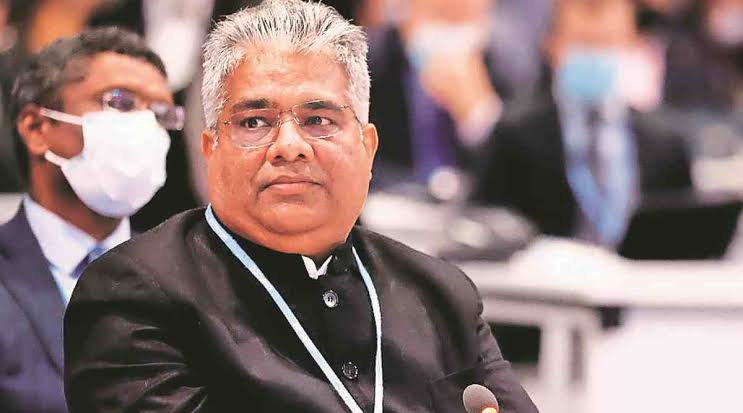The Minister highlighted India’s message of ‘Oneness with Nature’ and integrating Sustainable Lifestyles in the Effective Management of Wetlands, at the High-level Ministerial Segment Over the past decade, India expanded the list of Ramsar Wetlands by 250 percent and achieved Asia’s Largest Network comprising 91 Sites: Shri Bhupender YadavOver 2 Million Citizens Mobilized Under Mission Sahbhagita and Save Wetlands Campaign, Supporting Ground-Truthing of 170,000+ Wetlands across India
Union Minister for Environment, Forest and Climate Change, Shri Bhupender Yadav, is leading the Indian delegation at the 15th Meeting of the Conference of the Contracting Parties (COP15) to the Ramsar Convention being held at Victoria Falls, Zimbabwe from 23rd July to 31st July 2025.
Addressing the event, Shri Yadav highlighted India’s contribution to global wetlands conservation, informing that India has 91 Ramsar Sites (1.36 million ha), which is the largest network in Asia and third largest globally. He highlighted this achievement during his intervention on ‘Strengthening Policy and Legal Frameworks by Mainstreaming Wetlands Conservation’ at the High Level Ministerial Segment of COP15.
In his address, Shri Yadav stated, “Over the past decade, we have expanded this network by 250 percent. For the first time, two Indian cities—Udaipur and Indore—have been accredited as Wetland Cities, showing our commitment to urban wetlands.”
Referring to the leadership of the Prime Minister Shri Narendra Modi and his message of “Oneness with Nature” and “Vasudhaiva Kutumbakam”, Shri Yadav highlighted the active participation of communities through ‘Mission LiFE’ and ‘Ek ped Maa ke naam’. These visionary initiatives of the Prime Minister, he stated, supplement the efforts in protection of nature, conservation of wetlands flora and fauna, abating degradation and erosion of soil. The Minister invited all to plant a tree in the name of mother and advised all to adopt Mission LiFE i.e environment friendly lifestyle.
Aligned with this, India’s ‘Mission Sahbhagita’ and the ‘Save Wetlands Campaign’ have mobilised more than 2 million citizens, resulting in the ground-truthing of over 170,000 wetlands and the boundary demarcation of nearly 100,000 wetlands across the country.
The Minister emphasized that wetland conservation in India is deeply rooted in constitutional, legal, and policy frameworks. The Indian Constitution encapsulates this spirit by mandating the State and citizens to protect and conserve the environment and to safeguard forests and wildlife. Conservation of wetlands has been mainstreamed in India’s sectoral plans and programmes, including, the National Biodiversity Strategy and Action Plan, National Wildlife Action Plan.
Highlighting the UNEA Resolution 6/8 on sustainable lifestyles, the Minister emphasised mainstreaming of sustainable lifestyles in India’s policy and programmes, including conservation of wetland.
During the visit, the Minister also engaged in bilateral meetings with the heads of the Convention on International Trade in Endangered Species of Wild Flora and Fauna (CITES), Ramsar Convention on Wetlands, Convention on Conservation of Migratory Species of Wild Animals (CMS). A meeting was also held with the Minister of Environment, Climate and Wildlife, Zimbabwe, Dr. Evelyn Ndlovu, to advance cooperation on wetland restoration and knowledge exchange.
The Minister further highlighted the importance of India’s Global Environmental Initiatives to advance climate action and biodiversity conservation through international partnerships, such as the International Big Cat Alliance (IBCA), Coalition for Disaster Resilient Infrastructure (CDRI), International Solar Alliance (ISA), and Sustainable Lifestyles and requested to join these international initiatives.
The Ramsar COP15 brings together 172 Contracting Parties, International Organisation Partners, scientific institutions, civil society, and community representatives to agree on work programme and budgetary arrangements for the next triennium and consider guidance on a range of ongoing and emerging environmental issues. India’s active participation at COP15 underscores its unwavering commitment to wetlands conservation, climate leadership, and advancing the principles of ecological sustainability and intergenerational equity.
Source; PIB





